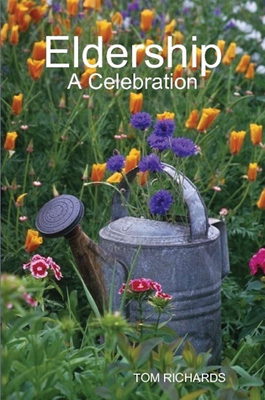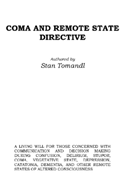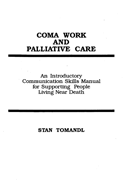
Interview with Tom Richards, co-author of An Alzheimer’s Surprise Party
Question: Alzheimer’s disease is devastating for individuals, caregivers, and families. What message does your research have for these folks?
“Our research explores the mystery, and dispels the stigma, of Alzheimer’s dementia by revealing its potential for meaningful communication, intimate relationship, and spiritual healing. We offer hope and meaning in the midst of one of life’s scariest and most difficult processes.”
Question: How do you do that? How do you work with Alzheimer’s patients?
“By applying new sentient communication skills and meticulously documenting our exploration, we demonstrate that Alzheimer’s patients are able to work on themselves psychologically and communicate with others during all stages of Alzheimer’s with outcomes including psychological, soulful, and spiritual growth processes and healing.
“Sentient communication skills are finely tuned observation and facilitation skills. Sentient refers to very subtle communication signals, or portals/openings, that often lead to deeper communication, relationship, and healing by following their natural flow. Sentient signals that are noticed, supported, and nurtured respond with feedback. Following the flow of positive feedback unleashes this creative healing process.
“Take the case of a dementia patient in metabolic coma: Providing positive feedback to the patient about the movement of her left foot that she is unaware of, brings back that awareness to her. She responds with positive feedback by moving her whole left leg. We follow in turn with positive feedback, ‘Ahhh, you just moved your left leg. That’s great!. . . Now you just took a really deep breath.’ As a result of following her process with positive support her eyes open and she awakens from coma. This process took forty-five minutes.”
Question: That is an interesting example. Is the work really that straight forward?
“Yes and no. It is difficult to use language to describe a sentient experience. I only described the facilitator’s observable interventions, and the patient’s observable responses at the sentient ‘Ah ha’ moment, in the process, making the process appear linear, cognitive, and easily accomplished.
The deep sentient experience of the patient, however, is multidimensional, occurring during an altered state of consciousness. This nonlinear flow by its very nature cannot be adequately expressed in language by either patient or facilitator. What is frustrating to my Western scientific training, is that neither the facilitator nor the patient really need to know, or may ever know the content of the process.
Also, frustrating and humbling to me, is bowing to the ‘wisdom of the process’. The facilitator, which is somewhat of a misnomer, does not ‘make’ anything happen. The skill of ‘following nature’ is counter to our culture, which is oriented toward making things happen. Sentient communication facilitation on the other hand ‘follows the flow of nature’, the result or side effect of which is often healing. Sentient communication facilitation is science and art, linear and nonlinear, cognitive and experiential. As in any specialty, the basic skills can be learned with a modest amount of training. Mastery is a lifetime endeavor.”
Question: Your results suggest that the Alzheimer’s state is not simply a vacuum. Is this true in every case?
“In our experience dementia patients are communicating at all times. Just as space is not empty, there is no such ‘vacuum’ state of consciousness. “
Question: What exactly goes on in an Alzheimer’s dementia state?
“Alzheimer’s parallels ‘normal life’ processes in many ways except for its intense inward focus and extreme detachment. The processes we have observed occurring in Alzheimer’s include: working on unfinished business; harvesting; imparting blessings; creating sacred space; meaning; and spiritual connections.
“For example: completion of ‘unfinished business’ such as resolving individual and family issues; ‘harvesting’ such as recalling and savoring life experiences; ‘imparting blessings’ by openly accepting loved ones; creating ‘sacred space’ via a secure feeling with a sense of something larger than ourselves; ‘meaning’ by exploring formative experiences and essential beliefs; and ‘spiritual connections’ such as immersing in the beauty of eternity or finding God’s love.“
Question: Can you really communicate with people in advanced Alzheimer’s states. Aren’t they just gone? Aren’t their memories really gone?
“In our experience we have found that: 1) the memories are not necessarily ‘gone’, but the desire to access them has diminished because the inner work the Alzheimer’s patient is doing takes precedence; 2) many pre-Alzheimer’s character traits do remain intact post Alzheimer’s, as in one client who maintained their ‘sense of humor’ and ‘caring nature’; 3) the inner work the patient is doing in the Alzheimer’s state can often be foreshadowed from their ‘normal life’ patterns.”
Question: There is a great deal of humor evoked in most conversations about Alzheimer’s and memory loss. But Alzheimer’s and memory loss are really not funny, especially to those afflicted. What is the humor about?
“Alzheimer’s ‘infects’ all of us. Almost everyone is afraid they are going to ‘lose it’, and we all do at times. The humor is about recognizing our own forgetfulness foibles.”
Question: You refer to “spiritual healing”. What exactly do you mean by “spiritual healing?”
“The healing of non-physical pain such as guilt, anger, depression, lack of meaning and purpose, and disconnection are some of the emotional and spiritual healing processes we are referring to. Western medicine historically deals with the human body as a mechanical device, a machine, and works to heal the mechanisms. Spiritual healing (not necessarily attached to religion) deals with the entire body, mind, soul, and spirit.”
Question: Your methodology is called Process Work. What is Process Work?
“Process Work is a new awareness-based psychology that facilitates individuals, families, organizations, and communities by following the deeper creative nature of their issues.”
Question: Alzheimer’s is such a difficult and complex problem, whatever motivated you to work with Alzheimer’s?
“Prior to working with Stanley, Stan’s father, I had never heard the term Alzheimer’s or been exposed to it, or anyone with Alzheimer’s. In truth, I didn’t know what I was getting into. I was drawn into it like a moth to a flame to help my best friend and his family.
“And, if I had had conventional medical or psychological training, we would never have accomplished what we have accomplished. As Einstein so apply put it, ‘No problem can be solved from the same consciousness that created it’.”
Question: Why did you write this book?
“Initially I wrote the first chapter, the story of the Surprise Party as a process of grieving over Stanley’s passing/transition. However, I had recorded and studied every interaction with Stanley over a four year period to further my study of Process Work, and to explore the potential benefits of it for Alzheimer’s patients. Stan (Stanley’s son and co-author) recognized the need to finish the book, and we collaborated on it for another fifteen years.”
Question: Your work is based on an in depth case, the case of your co-author’s father. How can you claim to extend the results to other cases and other dementias?
“We have worked with hundreds of individuals in all stages of dementia including coma. Stanley’s case is simply the most extensive, and most comprehensively documented case we have to write about. In all of these cases of altered states of consciousness including Stanley’s, the results have been the same. There is a creative life process in the background seeking expression.“
Question: The name of your book is An Alzheimer’s Surprise Party. That is an interesting twist.What is the story behind the name?
“The name has several levels of meaning: 1) the party we threw for Stanley the day before he died was a surprise party 2) the fact that Stanley was ‘home’ or ‘present’ at his party, and our research hypothesis that someone even with advanced Alzheimer’s or coma is always ‘home’ is a ‘surprise’ to the conventional wisdom about Alzheimer’s 3) Alzheimer’s itself is a kind of surprise ‘party’, full of surprises including the initial diagnosis, lack of diagnosis, or misdiagnosis. Alzheimer’s has been a mystery full of surprises for over a hundred years.”
Question: Do you have a specific writing style?
“Yes, our style is ‘intense, intimate, and urgent first person present tense’. We place the reader in the room with us in the moment, including the moments when death and/or ecstasy are imminent.“
Question: What is your favorite part of the book?
“My favorite part of the book is the conversation that Stan and I have in the last chapter. I have a vivid picture of us in my mind as we sprawled out in our office and tried to get our minds around our intense effort to record our experiences. My most touching moment with Stanley was, when in his advanced Alzheimer’s state, he said he needed me to come back.“
Question: When people are in advanced Alzheimer’s or coma and look peaceful, why do you want to disturb them?
“We know that during both ‘normal states of consciousness’ and ‘altered states of consciousness’ most everyone has experienced the tendency of being ‘stuck’. Which means that the individual is seeking new information and can’t quite reach it. With Alzheimer’s patients we support their reach. Because we are following their process, we are confident that our support will either be effective or simply be ignored, but not a disturbance in the normal sense of the word. An advanced Alzheimer’s patient is actually very powerful in one sense, and will offer no feedback, no response, if our support is in any way off the process. If we are in fact supporting them, then they will respond with positive feedback, with a noticeable response to the best of their ability.”
Question: Sometimes Alzheimer’s patients become unruly and difficult to handle. How do you handle and explain aggressive behavior?
“This is a huge and complex subject. Aggressive behavior is an altered state of consciousness linked with other altered states of consciousness: forgetfulness, confusion, high drama, agitation, delirium, dementia, and other remote states.
“Aggressive behavior is the messenger, not the message. Aggressive behavior can be the result of something as simple and ‘normal’ as a) frustration of trying to express oneself or be understood, b) fear of being touched without warning, c) upset over being told or forced to do something against your will, etc.
“Applying sentient communication facilitation to these states helps shed light on their mysterious nature, making them more useful and less intimidating to patients, family members, friends, caregivers, and the community.
“For patients and care facility residents this means the opportunity of knowing and experiencing themselves on their own terms and in their new states of consciousness; and with less physical and pharmacological restraints.
“For families, friends, and caregivers this means reduced feelings of hopelessness and burnout; less fear, added peace of mind, and reduced stress; and the opportunity of being in closer relationship with the individual.”
Question: What kind of “conscious decisions” can an advanced Alzheimer’s patient make?
“In our experience, using sentient communication facilitation there is no limit to the decisions that an Alzheimer’s patient can participate in.
“Sometimes difficulties are evoked by: a) not consulting with the patient about the specifics of their treatments and personal care regardless of their state of consciousness, b) assuming that ‘nobody is home’ thereby acting as if the patient is inert, and c) expecting the patient’s communication and understanding to conform to our conventions. Any or all of these actions removes the patient from the decision making process and robs the caregivers of valuable feedback about the patient’s personal well being.
Question: What everybody wants to know is do you have any recommendations for preventing Alzheimer’s dementia?
“Yes. In our Chapter Nine summary we outline five specific recommendations for helping prevent Alzheimer’s. First, and foremost, read our book! Our book expands your awareness of Alzheimer’s and contains exercises designed to immunize you with homeopathic doses of the Alzheimer’s experience. Second, we suggest ways to create your own opportunities to explore the Alzheimer’s state, to forget, until you can learn to drop your personal agenda and be present in the moment. Third, we recommend exploring your own issues around physical, emotional, and spiritual intimacy. Fourth, we recommend completing unfinished business and dropping outmoded behaviors, beliefs, and personal history that no longer work for you. Fifth, we recommend fully exploring even the most minor episodes of forgetfulness instead of glossing over them.”
* * *
EXCITING NEWS: An Alzheimer’s Surprise Party is now available as an eBook through the Appple iTunes Store for readers who own an iPhone, iPad, or iPod touch using the iBooks App. Click here to go to iTunes Store.
* * *
- Alzheimer’s
- dementia
- delirium
- senile
- senility
- senile dementia
- vascular dementia
- confusion
- forgetfulness
- stroke
- memory loss
- coma
- communication
- Arnold Mindell
- process work
- process oriented psychology
- awareness
- sentient awareness
- sentient care
- spiritual care
- prevention




